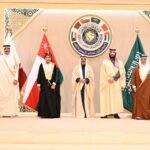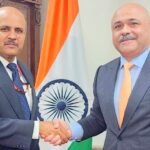
BY MOHAMMAD TARIQUE SALEEM FROM KUWAIT

The 45th Summit of the Gulf Cooperation Council (GCC), held in Kuwait, has drawn global attention with its emphasis on unity, progress, and regional collaboration. Journalists worldwide gathered at the summit, gaining unprecedented insights into the council’s historical legacy and forward-looking initiatives. The event reflected the GCC’s enduring commitment to addressing regional and global challenges, particularly those impacting the Muslim world.
On November 30, journalists were invited to explore the GCC Pavilion, a thoughtfully organized exhibition showcasing the council’s history and evolution. Photographs of the GCC’s founding leaders and current rulers adorned the space, symbolizing the unbroken legacy of cooperation and progress. These leaders’ contributions underscore the council’s role as a unifying force in a region historically marked by shared culture, religion, and aspirations.

The Pavilion also provided detailed insights into the council’s journey since its inception in 1981, including its milestones, achievements, and evolving strategies. Historical displays traced the GCC’s origins, highlighting the first meeting of its founding members in Abu Dhabi on May 25, 1981. This summit culminated in the signing of the council’s statute, which emphasized cooperation, coordination, and integration across economic, cultural, media, and legislative fields.

The Secretary-General’s Vision for Regional Unity : Jassim Al-Budaiwi, the current Secretary-General of the GCC, played a pivotal role at the summit, addressing key developments during a press conference at the Media Centre in Kuwait. Al-Budaiwi emphasized the GCC’s vital role in fostering economic and political collaboration among its six member states, Bahrain, Kuwait, Oman, Qatar, Saudi Arabia, and the UAE. Having assumed office earlier this year, Al-Budaiwi brings extensive diplomatic experience, including his tenure as Kuwait’s Ambassador to the United States and representative to NATO and the European Union.
His leadership marks a renewed focus on advancing Gulf integration while strengthening global partnerships. During the press conference, Al-Budaiwi outlined ongoing projects aimed at enhancing energy cooperation, digital innovation, and economic opportunities across the region. He highlighted the GCC’s proactive efforts to address evolving geopolitical challenges, reaffirming its commitment to regional stability and global security. The council’s initiatives reflect its dedication to tackling pressing issues such as climate change and the energy transition, key priorities for its energy-dependent member states.
Since its establishment, the GCC has prioritized economic integration as a cornerstone of its mission. The council’s 1981 Economic Agreement laid the foundation for joint economic action, focusing on initiatives like the Free Trade Area, Customs Union, and Common Market. These measures have facilitated the free movement of goods, services, and investments among member states, fostering an environment conducive to shared prosperity.
In 2001, the Supreme Council adopted an updated Economic Agreement, transitioning from coordination to integration. This agreement expanded the council’s focus to include industrial development, oil and gas resource management, environmental preservation, and human resource development. Notable achievements include the launch of the GCC Customs Union in 2003 and the GCC Common Market in 2008, both of which have significantly enhanced economic interdependence among member states.
The GCC’s ongoing efforts also extend to infrastructure development, with projects interconnecting transportation, electricity, and telecommunications networks. These initiatives underline the council’s vision of creating a unified Gulf region equipped to compete in a rapidly globalizing world. The summit served as a platform to discuss the GCC’s broader vision for sustainable development and regional security. Al-Budaiwi emphasized the council’s role in fostering socio-economic advancements and addressing global challenges.
The GCC’s focus on sustainability is evident in its support for international efforts to combat climate change and ensure a stable energy transition. By prioritizing innovation and technological progress, the GCC is positioning itself as a leader in digital transformation, further enhancing its global competitiveness. This forward-looking approach reflects the council’s commitment to creating opportunities for its citizens while contributing to regional and international stability.
The GCC’s founding leaders envisioned the council as a union of brotherly nations dedicated to shared prosperity and security. Statements from key figures, such as His Majesty Sultan Qaboos bin Said and His Highness Sheikh Khalifa bin Hamad Al Thani, reflect this commitment. Their words emphasize the importance of collective decisions, regional stability, and the deeply rooted connections among Gulf nations.
The current leaders continue to uphold these principles, with figures like His Highness Sheikh Mohamed bin Zayed Al Nahyan and His Majesty King Hamad bin Isa Al Khalifa reaffirming the GCC’s mission. Their leadership has helped the council navigate contemporary challenges while preserving its core values of unity and collaboration. As the GCC celebrates over four decades of achievements, its role as a regional hub for political and economic cooperation remains more critical than ever.
The council’s initiatives, from trade promotion to climate action, underscore its adaptability in addressing the complex realities of a changing world. The 45th Summit in Kuwait has highlighted the GCC’s enduring relevance as a unifying force in the Gulf and beyond. By fostering deeper integration among its member states and strengthening partnerships with global allies, the GCC continues to pave the way for a prosperous and secure future for the region and its people.











